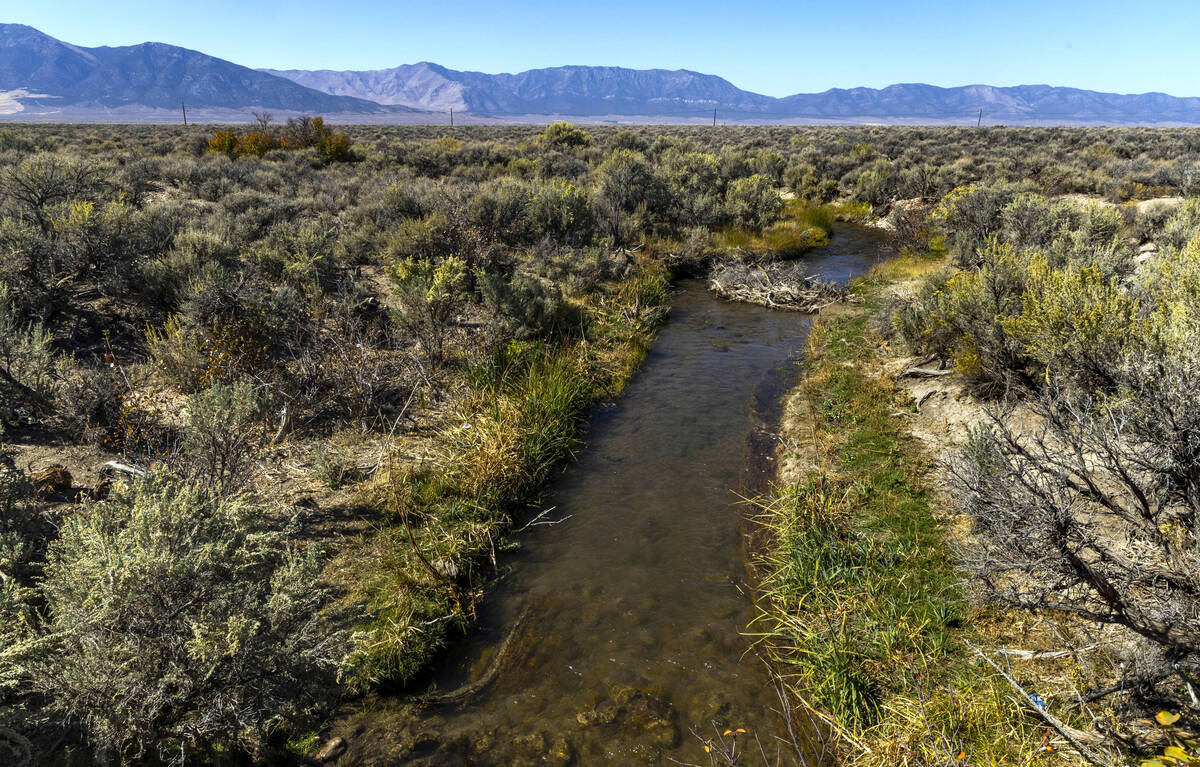GOP bill would require Nevada to nearly double water department budget
Deciding who can obtain the right to use water in the nation’s driest state is a long, complex process — one that a group of Republican state legislators is looking to speed up.
Assembly Bill 419, presented at a committee meeting on Wednesday, would directly change how the Nevada state engineer’s office goes about making those determinations. The bill is sponsored by GOP Assemblymembers Rich DeLong of Reno, Bert Gurr of Elko and Lisa Cole of Las Vegas.
The sweeping bill, according to its fiscal note, would require the state to almost double the Division of Water Resources’ more than $11 million budget, based on numbers from the 2023-24 fiscal year.
It would allow any water rights applicants to request a preliminary meeting with the state engineer and would require the office to submit a report to the Legislature every other year on pending applications. It would set earlier deadlines for how quickly the office must respond to applications and objections to the engineer’s decisions, among other changes.
“Almost everyone involved in water rights decisions in Nevada agrees that the process for conducting hearings and obtaining water permits for water rights is broken,” DeLong said. “People may have different ideas on specifics on how to do it, but everyone agrees the system needs to be improved.”
The bill was met with much more opposition and questions than support.
State engineer: Bill would double timelines
Though he testified in an informational capacity only, State Engineer Adam Sullivan said the passage of the bill would have the opposite effect of the legislative intent, which is to see more speedy decisions. In fact, he said timelines would double.
“The proposed process to hold a pre-application conference, make a preliminary determination, hold a period for receiving objections and then have an additional hearing would approximately double the review time for an individual application,” he said.
Sullivan’s office receives roughly 1,000 applications for water rights a year, and 10 to 20 percent of his decisions are protested, he said. If the bill is adopted into law, Sullivan said he worries new processes would favor applicants who have legal resources to challenge his decisions.
“It shifts the nature of the review process from a science-based, technical assessment to a more formal legal proceeding, which could disadvantage those who lack the resources to navigate such a system,” he said.
One of the two supporters of the bill was Karen Peterson, a lawyer representing Vidler Water Company, a small company that has historically worked with housing developers to secure water rights and build new infrastructure to grow cities across the West. The other was the Lincoln County Water District.
They both argued that more engagement between the state engineer and applicants on the front end could lead to fewer applications being submitted. People might not submit applications if they know that a denial is likely, they said.
“The bill does not favor applicants, give applicants more control in the permitting process or change the standards to appropriate water,” said Peterson, of the law firm Allison Mackenzie.
Southern Nevada Water Authority opposes bill
Among those that agreed the bill is an overreach were water districts from Las Vegas, central Nevada and the Reno area.
Andy Belanger, on behalf of the Southern Nevada Water Authority, said the agency supports the idea that reform is necessary to expedite the time it takes to receive a permit. He believes some provisions of the bill hold merit and should be revisited, including the idea that the state engineer should engage with the Legislature.
“I think the bill does too much too quickly,” Belanger said.
Others shared concerns about how the bill may prioritize new water rights applications rather than Nevadans with existing water rights.
According to science nonprofit The Nature Conservancy, more than half of Nevada’s 256 hydrological basins are considered “over-appropriated.” That means water users hold rights on paper to pump more water than the so-called “perennial yield,” or the total amount of water the state engineer deems is physically available each year.
Kyle Roerink, director of the Great Basin Water Network that advocates for water security, pointed to existing water law that requires the state engineer to decide if there is enough water to divvy up with no conflict to water rights holders.
“The applicant needs to prove these things,” Roerink said. “Look at the fiscal note, and take a long look at it. All it takes to file for water is filling out a two-page application and you write a $360 dollar check to the state engineer. What kind of entitlement are we giving with a bill like this?”
Contact Alan Halaly at ahalaly@reviewjournal.com. Follow @AlanHalaly on X.


















